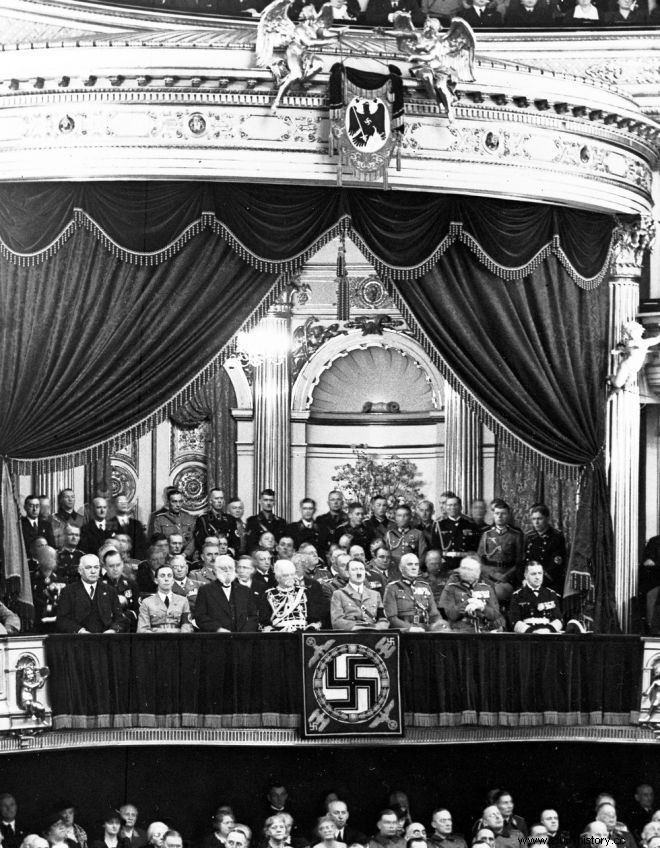*The article by James Whitman, professor of comparative and international law at Yale University, was published in Aeon. Aeon is an online magazine that asks big questions, looking for fresh answers and a new perspective on social reality, science, philosophy and culture. NEWS 24/7 will republish a story every week for those who love original thinking on issues old and new.
On June 5, 1934, about a year and a half after Adolf Hitler became Reich Chancellor, Nazi Germany's top lawyers gathered to draft what would later become the Nuremberg Laws , the centerpiece of the anti-Jewish legislation of the Nazi, racial ideology, regime. The meeting was an important one and a stenographer was present to take a verbatim record, to be preserved by the ever diligent Nazi bureaucracy as a record of a critical moment in the creation of the new regime.
This document reveals something startling:the meeting included extensive discussions about the laws of the United States of America. At its beginning, the Secretary of Justice presented a memorandum on the US Tribes Act, and in the course of the meeting, the participants repeatedly turned to the example of the US. They debated whether to bring Jim Crow segregation to the Third Reich (n.s. character in a parody of blacks, after which the legislation that imposed racial segregation in the southern US took its name).
They discussed in detail the statutes from the 30 US states that criminalized interracial marriage. They examined how US states determined who counted as "Negro" or "Mongolian" and weighed whether they should adopt US techniques in their own approach to determining who counted as Jewish. During the meeting the most ardent supporters of the American model were the most radical Nazis in the room.
The minutes of this meeting are just one piece of evidence in an unexamined story that is sure to make Americans cringe. In the early 1930s, the formative years of the Nuremberg Laws, Nazi policy makers looked to the American law for inspiration. Hitler himself, in Mein Kampf (My Struggle, 1925), characterized the US as "the one state" that had made progress in creating a "healthy racist society", and after the Nazis seized power in 1933, they continued to cite and reflect regularly on American models.
They found plenty of things to sneer at in US constitutional values, to be sure. But they also saw much to... admire in US white supremacy, and when the Nuremberg Laws were proclaimed in 1935, they almost certainly reflected direct US influence.
This story may seem unbelievable. Why did the Nazis feel the need to take lessons in racism from anyone? Why, in particular, were they looking at the US? Whatever its failings, the US is the bedrock of a great liberal and democratic tradition. Furthermore, US Jews—as many obstacles as they may have faced in the early 20th century—never faced state-sponsored persecution. And, in conclusion, Americans made enormous sacrifices in the struggle to defeat Hitler.

But the reality is that in the early 20th century, the US, with its vigorous and creative legal culture, led the world in racist legislation. This is not just true of the Jim Crow South. This is also true at the national level. The US had a race-based immigration law admired by racists around the world. And the Nazis, like their European far-right successors (and many American voters) were obsessed with the dangers of immigration.
The US stood out worldwide for the harshness of its anti-intermarriage laws, which not only prohibited racial intermarriage, but also threatened mixed couples with severe criminal punishment. Again, the law was not limited to the South. Established throughout the US. Nazi lawyers carefully studied the statutes, not only of states like Virginia, but also of states like Montana.
It is true that the US did not persecute the Jews - or at least, as a Nazi lawyer said in 1936, it did not persecute the Jews "until now" - but it created a number of forms of second-class citizenship for other minority groups, including Chinese, Japanese , Filipinos, Puerto Ricans, and Native Americans, throughout the Union and its colonies. American forms of second-class citizenship were of great interest to the Nazis, as they began to create their own forms of second-class citizenship for German Jews.
Also, the US was the greatest economic and cultural power in the world after 1918 - dynamic, modern, rich. Hitler and other Nazis were jealous of the US and wanted to know how the Americans did it. It's no big surprise that they believed that what made America great was American racism.
Of course, as bad as American race law was, there was no American model for Nazi extermination camps, even if the Nazis often expressed their admiration for the American conquest of the West when, as Hitler declared, the settlers had "restricted the millions of red-skinned people to a few hundred thousand".
In any case, extermination camps were not the issue in the early 1930s when the Nuremberg Laws were formulated. The Nazis were not yet thinking of mass murder. Their goal at that time was to force the Jews by any means possible to leave Germany, in order to preserve the Third Reich as a pure "Aryan" country.

And here they were really convinced they could recognize American models - and some odd American heroes. For a young Nazi lawyer named Heinrich Krieger, for example, who had attended the University of Arkansas as an exchange student, and whose painstaking research into American race law formed the basis for the work of the Nazi Justice Department, the great Americans heroes were Thomas Jefferson and Abraham Lincoln . Did not Jefferson, in 1821, say that it is certain that "the two races, equally free, cannot live under the same government"? Didn't Lincoln often say, before 1864, that America's only real hope was to resettle the black population somewhere else?
To the Nazis who believed that Germany's only hope was the forced immigration of the Jews, these might seem like shining examples.
None of this is entirely easy to discuss. It is difficult for Americans to overcome the feeling that if they influenced Nazism, they have been infected in ways that can never cease to exist.
However, the evidence is there, and we cannot take it away from either German or American history.
